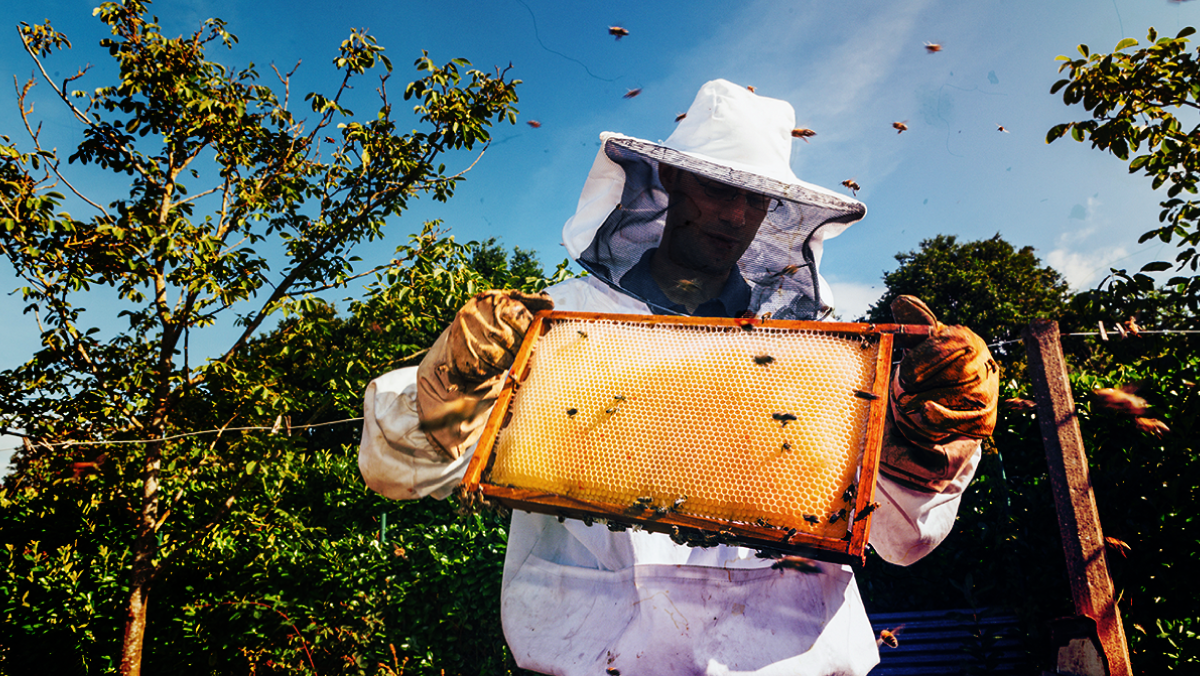Did you know that almost 90 percent of wild plants and 75 percent of leading global crops depend on animal pollination?
That’s translates to one out of every three mouthfuls of our food. And crops that depend on pollination are five times more valuable than those that do not. That’s why more and more corporations are rewilding their perfectly manicured lawns, throwing away their insecticides, and making space for some of the most important pollinators on the planet — bees.
Back In 2020, Cisco started our own beekeeping project. In partnership with Bee Downtown and the RTP Foundation, we’re rewilding the perfectly landscaped grounds at RTP into a wildflower haven for pollinators, and installing three honeybee hives on the campus. . The goal? To support and protect pollinators and be part of a movement dedicated to educating people about the importance of honeybees, showing them how we can each play our part in protecting bee populations across the world.
Bees come in many different shapes and sizes, but they are all part of the Apidae family, which includes honeybees, stingless bees, bumble bees, carpenter bees, Diadasia bees, long-horned bees, orchid bees, and the ground-nesting Anthophora bees. You can find them in many different types of habitat, from marshes, shingle, sand dunes, soft cliffs, heathlands, wetlands, chalk grasslands, quarries, gravel pits, sea walls and even post-industrial land. Our own Cisco bees settled into their new home quickly, and have been busy ever since, pollinating local flowers, increasing their populations — and producing our very own Cisco honey.
“We brought Cisco’s Global Conservation efforts home to our Cisco Corporate Campus in RTP,” said Cecile Willems, Marketing Director, and founder of the RTP Connected Bees Team. “This effort is an important part of our sustainability strategy and is part of Cisco’s CSR commitment. By collaborating with a number of teams in Cisco, we created a blueprint now in place at RTP, that would support other Cisco Offices around the globe to follow.”
Education is a priority for the team, who share their beekeeping buzz not just with Cisco employees but with their friends and families, through hive tours and honey sampling events. Attendees get to zip into a full bee suit and get hands (well, gloves) on — opening a hive, using a smoker and learning how to handle frames and bees carefully, all the while learning about the vital role bees play in protecting the biodiversity of the earth.
The decline of bees is part of a much broader decline of wildlife around the world caused by a number of factors, of which climate change is just one. Bees need diverse and lush spaces to thrive, so when ecosystem diversity is affected, pollinator populations are also affected. Pesticides are a leading cause of colony collapse. The parasite Varroa is another huge threat, affecting bees worldwide, weakening their immune systems and transmitting disease. And the non-native Asian Hornet is also causing significant losses to bee colonies as well as other ecosystems.
Jordan Hart-White, energy and sustainability manager, and co-founder of the RTP apiary, shared her thoughts on the wonder of bees.
“Looking inside a hive is an incredible experience,” she explained. “You can see how the bees work together, creating symmetry across everything they do, from the hexagonal mass of cells they build to grow their larvae and stores of honey, to the way they dance to show where flying bees can find pollen. Each bee has their own role to play, living together in perfect harmony. Humans can learn a lot from bees!”
Cisco now has a thriving community of beekeepers from countries across the globe, all passionate about conservation and protecting bee populations.
“To be able to sit outside and feel that balance in nature is so important, it is a gift,” said Hart-White. “As humans, we often forget the impact that we have on our environments and the creatures who live alongside us. We need to ask ourselves, is the perfect lawn really that important? Or can we put away our pesticides, and open our minds and our gardens, to nature.”
Celebrate World Bee Day with us on May 20th by planting bee-autiful plants in your garden that pollinators will love, supporting your local honey producers or sharing the buzz about how important honeybees are to our fragile ecosystems.
Cisco is committed to solving global problems such as hunger and protecting endangered species – and part of the solution is protecting honeybees. To read more about Cisco’s Corporate Social Responsibility efforts, visit https://www.cisco.com/c/en/us/about/csr.html.
###




